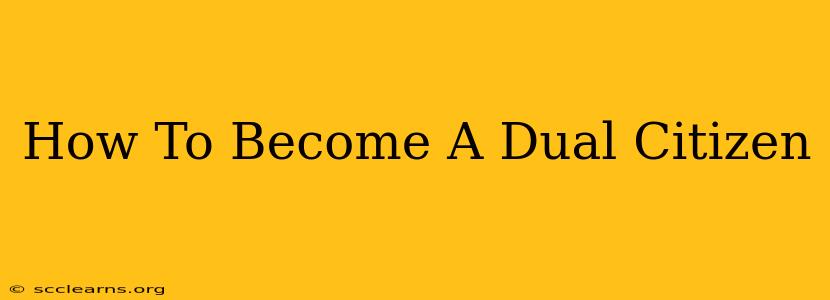Dreaming of holding two passports? The allure of dual citizenship is strong—offering expanded travel opportunities, potential business advantages, and a deeper connection to your heritage. But navigating the process can feel daunting. This comprehensive guide breaks down how to become a dual citizen, outlining the key steps and considerations involved.
Understanding Dual Citizenship
Dual citizenship, or dual nationality, means being a citizen of two countries simultaneously. Each country has its own specific laws regarding dual citizenship, and these can vary significantly. Some countries readily permit it, while others prohibit it entirely or have complex restrictions. Understanding your eligibility is the crucial first step.
Key Factors Affecting Eligibility:
- Your Country of Birth: Your birthplace's citizenship laws are paramount. Some countries grant citizenship by birthright ( jus soli), while others grant it based on the citizenship of your parents (jus sanguinis).
- Your Parents' Citizenship: Even if you weren't born in a country, you might be eligible for citizenship based on your parents' or grandparents' nationality. This often requires demonstrating a continuous lineage.
- Marriage: In some cases, marrying a citizen of another country can pave the way to obtaining citizenship. Requirements vary drastically depending on the country.
- Residency Requirements: Many countries require a period of residency before granting citizenship. This can range from a few years to a decade, and often includes specific conditions such as language proficiency or integration tests.
- Naturalization: This process involves meeting specific criteria, such as living in the country for a set period, demonstrating good moral character, passing a citizenship test, and swearing an oath of allegiance.
Steps to Obtain Dual Citizenship
The exact steps will vary depending on the countries involved and your specific circumstances. However, a general framework includes:
1. Research and Preparation:
- Identify Potential Citizenships: Determine which countries you might be eligible for based on your family history and birthplace.
- Gather Necessary Documentation: This typically includes birth certificates, marriage certificates, passports, and possibly additional proof of residency or lineage. Accuracy and completeness are essential.
- Understand the Specific Requirements: Each country's process is unique. Carefully review the specific rules and regulations of each relevant country's embassy or consulate.
2. Applying for Citizenship:
- Complete Application Forms: These forms are usually available online or through the relevant embassy or consulate. Ensure you provide accurate and complete information.
- Submit Supporting Documentation: Organize all your documents meticulously and submit them according to the instructions.
- Attend Interviews or Examinations: Some countries require interviews or examinations to assess your knowledge of the country's history, laws, and language.
- Pay Necessary Fees: Be prepared to pay application and processing fees.
3. Oath of Allegiance and Citizenship Grant:
- Swear an Oath of Allegiance: Once your application is approved, you’ll usually need to swear an oath of allegiance to the new country.
- Receive Your Citizenship Certificate: This document formally confirms your citizenship.
Potential Challenges and Considerations:
- Lengthy Processing Times: Be prepared for potential delays. The process can take months or even years.
- Complex Requirements: Navigating the bureaucratic requirements can be challenging. Consider seeking professional assistance if needed.
- Tax Implications: Dual citizenship can have implications for your tax obligations in both countries. Consult with a tax advisor.
- Military Service: Some countries may require you to fulfill military service obligations.
Conclusion: A Rewarding Journey
Obtaining dual citizenship can be a rewarding yet complex process. Thorough research, meticulous preparation, and patience are key to success. Remember to consult with legal professionals if you encounter any difficulties. Good luck on your journey to dual citizenship!

